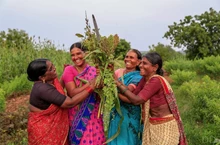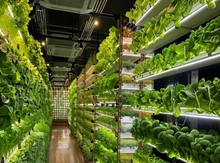
At the Goldschmidt geochemistry conference in Lyon, postdoctoral researcher Dr Ekta Tiwari from the Sistla group at California Polytechnic State University presented alarming findings about the significant plastic pollution caused by plastic mulch in Californian strawberry farms.
Plastic mulch, commonly used to enhance strawberry growth, has been found to shed large quantities of plastic fragments into the soil, posing serious threats to soil quality and raising concerns about the long-term sustainability of plastic mulch usage, not only in California but with potential global implications for agricultural plastic use.
Plastic mulch, mostly made of polyethylene, offers various benefits in agriculture, such as controlling weeds and pathogens, reducing water evaporation, and preventing soil splashing on fruit, which is particularly important for strawberries. It is applied around the base of the plants and removed after the seasonal production of the crop.
However, even with careful land stewardship, fragments of plastic are left behind and adhere to the soil during removal. This has led to the accumulation of plastic particles, specifically macroplastics (particles larger than 5mm), in farm soils over decades of annual plastic mulch application and removal, even in well-managed fields.
Dr Tiwari's team conducted a systematic survey of strawberry fields after plastic film removal and found a fairly uniform distribution of macroplastic particles on the field surfaces, with up to 213,500 particles per hectare.
The researchers are also investigating the presence of microplastics (particles smaller than 5mm) in the soil samples. Preliminary findings indicate that increased levels of macroplastic pollution are associated with decreased soil moisture content, reduced microbial respiration, and lower availability of plant nitrogen.
The study highlights the environmental cost of using plastic mulch in agriculture, as these plastic particles are challenging and expensive to remove from the soil, remaining there indefinitely. Although alternatives like biodegradable plastic mulches or natural mulches such as straw exist, they come with economic costs. However, the use of plastics in agriculture is becoming increasingly regulated.
Commenting on the research, Professor Sean Schaeffer from the University of Tennessee emphasizes the importance of plastic mulches for agricultural production, as they serve multiple purposes, including soil moisture retention and pest control. Agricultural plastic use is on the rise globally, with California being a major consumer in the US. Studies on the fate and transport of plastics in soil and water systems are relatively recent, making research like this essential to understand the extent of the plastic problem.
It's crucial to note that the work presented by Dr Tiwari is ongoing and has not yet undergone peer review. The researchers are continuing their investigation into the level of microplastic pollution caused by plastic mulches.
This study provides critical baseline data for understanding plastic pollution in the US agricultural system and can aid in developing better land management practices by assessing the biogeochemical consequences of plastic accumulation in agricultural soils. Further collaboration with manufacturers aims to find ways to mitigate the environmental costs associated with plastic mulch usage.











